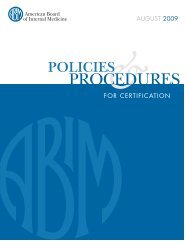The SRA Symposium - College of Medicine
The SRA Symposium - College of Medicine
The SRA Symposium - College of Medicine
You also want an ePaper? Increase the reach of your titles
YUMPU automatically turns print PDFs into web optimized ePapers that Google loves.
Papers<br />
• Cross Unit Collaboration and Problem Solving<br />
In October 2001, the Sponsored Programs Implementation Team (SPIT) was commissioned for<br />
two years to develop improvements in pre- and post-award research administration. Specifically,<br />
SPIT was charged to validate a list <strong>of</strong> issues and priorities, to complete a situation analysis, and to<br />
deliver solutions. Many <strong>of</strong> these issues related to making central administration more responsive<br />
to the needs <strong>of</strong> unit administrators. Others focused on maximizing the value <strong>of</strong> the new financial<br />
system (PeopleS<strong>of</strong>t). SPIT was a cross-functional representation <strong>of</strong> research administrators from<br />
the University <strong>of</strong> Michigan’s central and unit level administration. Its main areas <strong>of</strong> focus were:<br />
Financial Reporting<br />
Project Administration<br />
Project Initiation<br />
Organization/Communications<br />
<strong>The</strong> SPIT model has created new leadership opportunities for unit research administrators. After<br />
SPIT’s commission ended, a “Sponsored Projects Advisory Team” (SPA Team) was formed. <strong>The</strong><br />
SPA Team’s basic purpose is to identify emerging issues, evaluate them, recommend solutions, and<br />
monitor their progress after changes are implemented (www.spateam.umich.edu).<br />
<strong>The</strong>se types <strong>of</strong> team efforts have set the standard for collaboration between unit research administrators<br />
and staff in central <strong>of</strong>fices. <strong>The</strong> communication and, in some instances, turf barriers which<br />
once hindered problem solving are being overcome with the use <strong>of</strong> the SPIT model. It has also had<br />
the effect <strong>of</strong> making staff in all units feel a sense <strong>of</strong> collective support and responsibility, which<br />
now defines the research community at Michigan.<br />
• Recognition Programs<br />
As part <strong>of</strong> the strategy to elevate and recognize pr<strong>of</strong>essional research administration at Michigan<br />
the Office <strong>of</strong> the Vice President for Research (OVPR) established the annual Distinguished Research<br />
Administrator and OVPR Exceptional Service Awards in 2001. Nominations are requested<br />
campus-wide.<br />
<strong>The</strong> Distinguished Research Administrator Award honors individual staff members from any unit<br />
at Michigan who have demonstrated over a number <strong>of</strong> years distinguished service exemplifying<br />
the goals <strong>of</strong> pr<strong>of</strong>essional research administration. <strong>The</strong> OVPR Exceptional Service Award honors<br />
individuals or teams involved in any area <strong>of</strong> research administration work who have made outstanding<br />
contributions which go beyond the ordinary fulfillment <strong>of</strong> the position’s duties. Each<br />
winner receives an honorarium and an award plaque.<br />
<strong>The</strong> Results<br />
<strong>The</strong> University <strong>of</strong> Michigan has created a recognizable pr<strong>of</strong>essional community, which can be used<br />
as a model for other internal pr<strong>of</strong>essional groups. Research Administrators Instructional Network<br />
(RAIN) education and training programs are effective in building skills and knowledge. Research<br />
Administrative Network (RAN) meetings have provided a gathering place for the community. <strong>The</strong><br />
emphasis on networking has also created an environment where administrators are more comfortable<br />
communicating with their peers to share information and to problem solve. <strong>The</strong> cross-functional<br />
problem solving teams (SPIT & SPA) have had a dramatic impact, not only by creating and<br />
implementing solutions to issues affecting administrators, but also by serving as a model for the<br />
process <strong>of</strong> crossing boundaries to solve problems. <strong>The</strong> Office <strong>of</strong> the Vice President for Research<br />
(OVPR) awards brought university-wide recognition to the contributions <strong>of</strong> research administrators.<br />
64 2005 <strong>Symposium</strong> Proceedings Book

















